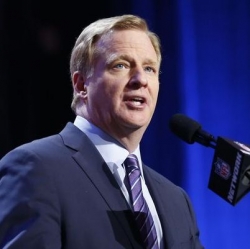As the National Footall League spring meetings begin this week, NFL Commissioner Roger Goodell gave his four core principles for legalized sports betting in the United States. The NFL long resisted the expansion of sports betting for decades, but the U.S. Supreme Court struck down a federal sports ban last week.
States like New Jersey and Delaware plan to move forward with sportsbooks in their casinos and racetracks in short order, so Commissioner Goodell used his opening remarks to league owners to stake out the NFL’s position on the issue. Saying the NFL wanted Congress to “enact uniform standards for states that choose to legalizes sports betting”, Goodell spelled out those core principles the NFL would lobby to for in those standards.
Goodell introduced his core principle by saying, “We have spent considerable time planning for the potential of broadly legalized sports gambling and are prepared to address these changes in a thoughtful and comprehensive way, including substantial education and compliance trainings for our clubs, players, employees and partners. These efforts include supporting commonsense legislation that protects our players, coaches and fans and maintains public confidence in our games.”
Those principles are (1) substantial consumer protections, (2) protection of content and intellectual property, (3) fan access to reliable league data, and (4) equipping law enforcement with the resources, monitoring, and enforcement tools to protect fans and penalize bad actors at home and abroad.
Consumer Protections for Sports Bettors
Some of those principles seem to be common sense. In fact, consumer protections are so basic they are a part of every single regulated gaming market in the world. While they are arguably the most important provision, it almost goes without saying that US gaming laws would have consumer protections, self-exclusion abilities, and responsible gaming tools.
By emphasizing consumer protections, Roger Goodell might be following the lead of NBA Commissioner Adam Silver. Mr. Silver said he wanted to protect the integrity of the game, then asked for a 1% integrity fee from the proceeds of sports betting to cover the costs of maintaining integrity. Some sports writers and gaming analysts pointed out that protecting the integrity of the game should cost no more now than before, if the sports leagues were taking all necessary steps to protect their games’ integrity before.
Protection of Content and Intellectual Property
The protection of content and intellectual property seems to be a key factor for the NFL. This is the second argument made by pro sports owners in the debate over sports betting. The NFL’s owners argue they should be paid what amounts to royalty fees by sportsbooks, because the bookmaker operations use the NFL’s intellectual property for their sports bets.
It is a similar argument that the NFL once made in the early days of the Internet. When fantasy football first began to gain mainstream appeal on the Internet in the late-1990s, the NFL tried to stop online sites from publishing game stats. The NFL wanted to shut down all fantasy football sites and force players to use a single NFL-owned fantasy football league site.
That proved to unenforceable. Also, the league soon realized the proliferation of fantasy football websites was a vast wealth of free publicity for the league and fans excited enough to play fantasy football were highly likely to watch NFL games on television. How the latest attempt to enforce the NFL’s intellectual property goes is anyone’s guess.
Reliable League Data
The third principle, involving fan access to reliable league data, sounds like a third possibility for collecting revenues from legal sports betting. In West Virginia, state officials recently held a conference with lobbyists from the sports leagues.
When the sports executives called for an integrity fee, officials and gaming executives countered by offering to make a deal to buy reliable sports data from the leagues. At the time, the sportsbook operators viewed the sale of “reliable sports data” as an alternative way to pay the leagues, while still receiving value. Its inclusion by Roger Goodell suggests the NFL wants to be paid for both.
Prosecuting Bad Actors
The fourth principle, which discussing the equipping of law enforcement to prosecute bad actors who do not follow the law, is something those in the gaming industry should watch closely. It signals that the NFL wants federal authorities to try to move against unlicensed and unregulated offshore gaming operators, as well as local bookies. It is unknown whether federal authorities resources and will to enforce such sanctions.
International Sports Betting Enforcement
When Australia passed its Interactive Gaming Amendment (IGA 2016), its officials worked with gaming regulators in the United Kingdom and Canada on coordination. Along the same lines, the Kahnawake Gaming Commission of Canada worked with the Division of Gaming Enforcement in New Jersey also worked to enforce New Jersey’s ban on offshore gaming sites. In short, the NFL might lobby Congress to coordinate efforts with UK, Canadian, and Australian regulators to punish operators who break the laws in one country, while trying to operate in another country.
If the Australian model is any indication, such measures would work on publicly-traded companies that seek gaming licenses in the “Five Eyes” countries, but not on unregulated offshore countries. The Australian land-based gambling companies forced out competition from the public companies, but found themselves unable to squelch competition from private-owned, unregulated offshore gaming companies.
Roger Goodell’s Core Principles
NFL Commissioner Roger Goodell‘s four core principles thus consist of three measures that justify the NFL asking for more revenues and a four measure that would help eliminate competition. While couched in high-minded terms, the bottom line is money. Of course, there is nothing wrong with such a bottom line. That is what one would expect from a league of 32 businessmen and businesswomen. Whether the arguments will win the day is another matter.

